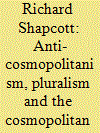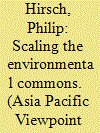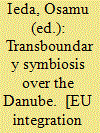|
|
|
Sort Order |
|
|
|
Items / Page
|
|
|
|
|
|
|
| Srl | Item |
| 1 |
ID:
086139


|
|
|
|
|
| Publication |
2008.
|
| Summary/Abstract |
For anti-cosmopolitan critics, cosmopolitanism is equated with the universalisation of a particular, liberal, account of justice and is therefore problematic for a number of reasons. The liberal principle 'do no harm' principle - and the cosmopolitan principle of humanitarianism, can be used to correct the depiction of cosmopolitanism as hostile to 'pluralism', to identify the universalism that is latent or undeveloped in much 'anti-cosmopolitanism', and to identify further means of reconciling these positions. A cosmopolitan harm principle argues that the absence of a universal conception of justice should not provide an obstacle to the recognition of an obligation to limit transboundary harms.
|
|
|
|
|
|
|
|
|
|
|
|
|
|
|
|
| 2 |
ID:
110814


|
|
|
|
|
| Publication |
2012.
|
| Summary/Abstract |
In the existing 276 international river basins, the increase in water variability projected by most climate change scenarios may present serious challenges to riparian states. This research maps the institutional resilience to water variability in transboundary basins and combines it with both historic and projected variability regimes, with the objective of identifying areas at potential risk of future hydropolitical tension. To do so, it combs existing international treaties for sources of institutional resilience and considers the coefficient of variation of runoff as a measure of past and future water variability. The study finds significant gaps in both the number of people and area covered by institutional stipulations to deal with variability in South America and Asia. At present, high potential risk for hydropolitical tensions associated with water variability is identified in 24 transboundary basins and seems to be concentrated mainly in northern and sub-Saharan Africa. By 2050, areas at greatest potential risk are more spatially dispersed and can be found in 61 international basins, and some of the potentially large impacts of climate change are projected to occur away from those areas currently under scrutiny. Understanding when and where to target capacity-building in transboundary river basins for greater resilience to change is critical. This study represents a step toward facilitating these efforts and informing further qualitative and quantitative research into the relationship between climate change, hydrological variability regimes, and institutional capacity for accommodating variability.
|
|
|
|
|
|
|
|
|
|
|
|
|
|
|
|
| 3 |
ID:
088931


|
|
|
|
|
| Publication |
2009.
|
| Summary/Abstract |
In the first decade of the 21st century, 'hydrosolidarity,' the notion that water management should include considerations of ethics and equity, has influenced international approaches to conducting environmental research and formulating water policy. Since its inception in the 1990s, the term appears frequently across a spectrum of water-related research. It has accordingly permeated discourses and publications on water management. Such rapid proliferation of the concept has helped usher in a wave of transition from conflict management to cooperative efforts between upstream and downstream basin users, as well as a complex paradigm that links both human and environmental welfare. In this paper, we trace the intellectual origins and changing conceptions of hydrosolidarity. We outline some of its applications as well as various reactions to the concept. We close by discussing how the concept can help frame negotiations between riparian states and influence treaty-making and institution-building in river basin settings.
|
|
|
|
|
|
|
|
|
|
|
|
|
|
|
|
| 4 |
ID:
169142


|
|
|
|
|
| Summary/Abstract |
In the Mekong Region, the Asian Development Bank and partners have promoted economic corridors as a way to achieve regional economic integration and growth. This study evaluates how a transboundary policy narrative of shared prosperity around the East–West Economic Corridor programme emerged, and then how it was elaborated and used, taking a set of border policies of the government of Thailand as cases. For two decades the shared prosperity narrative has been used by a coalition of elite actors to support a programme of investments in road infrastructure, as well as to push for agreements on trade, border logistics, investment and tourism. The shared prosperity narrative has helped maintain support for the programme despite its failures to meet projections and expectations. Although criticised by civil society and experts from time to time, no coherent shared counter‐narrative emerged. Policy elites in Thailand have used the transboundary narrative to justify investments in special economic zones, and transport infrastructure near the border and inside neighbouring countries. Thailand has also reproduced the narrative in support of efforts to bolster tourism cooperation, and negotiate cross‐border trade and logistics agreements. Roads and bridges have been built, underlining how discursive practices have material consequences and reinforce the narrative.
|
|
|
|
|
|
|
|
|
|
|
|
|
|
|
|
| 5 |
ID:
174808


|
|
|
|
|
| Summary/Abstract |
The transboundary environmental commons in Southeast Asia are normally conceived in terms of shared resources and environmental impacts that transcend national borders. The Mekong's ‘fugitive resources’ of water, fish and sediment and the issue of Indonesia's smoke haze drift into Malaysia and Singapore dominate discussion. Assumed national interests shape actors and institutional arrangements for transboundary commons governance. Failure to address the governance challenges is explained in terms of their politico‐cultural failings (e.g. the ‘ASEAN Way’ of non‐interference), the weak regulatory remit of agencies with a specific transboundary governance role (Mekong River Commission), the dominant developmental agenda of subregional cooperative arrangements (Greater Mekong Subregion) or the geopolitical dominance of China (Lancang–Mekong Cooperation). This article builds on these critiques by considering the relationship between the local commons impacted by transboundary projects and the framing of the commons at an inter‐governmental level. It shows that neglect of the local commons and the impacts on them of projects with transboundary effects is partly to be explained by the institutional scaling of the transboundary commons at a country‐to‐country level. It also argues for an expanded notion of transboundary, including investment and governance flows as well as the material environmental footprint of large‐scale investments.
|
|
|
|
|
|
|
|
|
|
|
|
|
|
|
|
| 6 |
ID:
135184


|
|
|
|
|
| Publication |
Sapporo, Uyana Tomohiko, 2014.
|
| Description |
133p.Pbk
|
| Series |
Slavic Eurasian studies; no.27
|
| Standard Number |
9784938637804
|
|
|
|
|
|
|
|
|
|
|
|
Copies: C:1/I:0,R:0,Q:0
Circulation
| Accession# | Call# | Current Location | Status | Policy | Location |
| 058014 | 320.12437309439/IED 058014 | Main | On Shelf | General | |
|
|
|
|
|
|
|
|
|